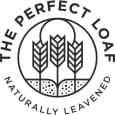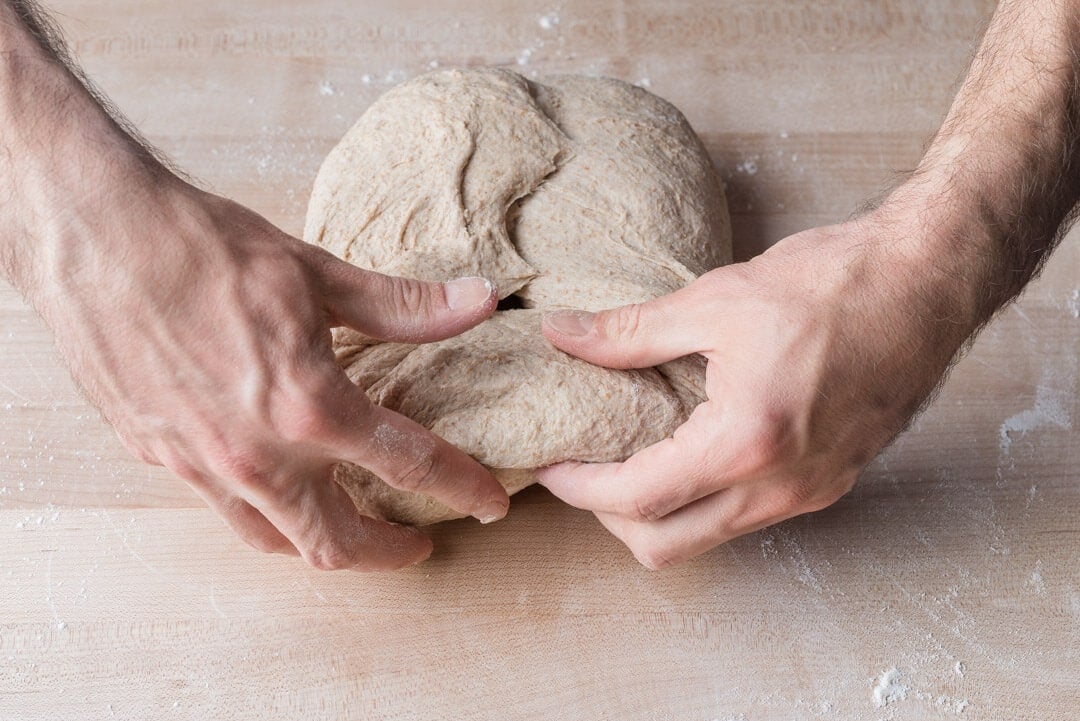The following roundup of sourdough baking guides here at The Perfect Loaf will help you navigate the waters of baking sourdough bread and sourdough pizza at home. Start with the Beginner Baking Guides up top and work your way down as you become familiar with each topic.
Of course, it all begins with your sourdough starter. First, visit the Sourdough Starter Guides section below to create your sourdough starter from scratch, learn how to maintain it, and, if necessary, store it when not in use.
Beginner’s Sourdough Guide
I like to break the sourdough bread-making process into eight steps (I discuss them in detail in my cookbook). While this may seem like many, most of the time your dough ferments all on its own.
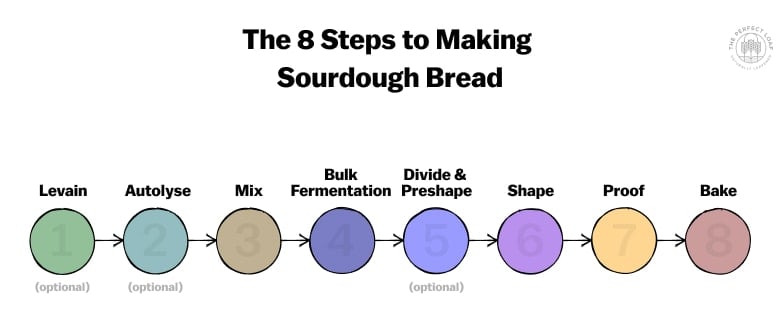
In my comprehensive Beginner’s Guide to Sourdough Bread, I’ll walk you through each step with great detail, from creating a preferment (levain) to finally baking the dough in the oven.
Or, you can dig into each step, below:
- Levain, a preferment that seeds fermentation in bread dough
- How to Autolyse, a technique for reducing mixing time and increasing extensibility
- Mixing Bread Dough, the critical step where ingredients are combined and the dough strengthened.
- A Guide to Bulk Fermentation, the dough’s first rise.
- How to Divide and Preshape, portioning the dough and preparing for shaping.
- How to Shape Dough, forming the dough into its final shape.
- How to Proofing Bread Dough, the dough’s second rise.
- How to Bake Bread Dough, scoring and baking dough in the oven.
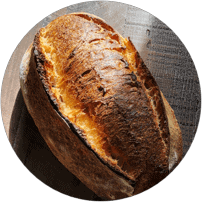
Beginner Bread Baking Guides
It all begins here. The first step is to make a sourdough starter, read guides on baking in a Dutch oven or home oven, and tips on why temperatures are so important.
- The Importance of Dough Temperature in Baking (with a Calculator)
- How to Mix Bread Dough for optimal dough strength
- How to Stretch and Fold Sourdough (strengthening the dough during bulk fermentation)
- How To Use the Poke Test To Avoid Underproofing and Overproofing Your Bread Dough
- Kneading with the Slap and Fold Technique
- The Best Way to Store Bread to keep it fresh
- Introduction to Baker’s Percentages
- How to Bake Sourdough Bread in Summer
- How to Bake Sourdough Bread in Winter
- How to Top Bread Dough (with seeds and other items)
- How To Take Notes When Baking Bread (with free downloadable notes worksheet)
- How to Bake Bread at High Altitude
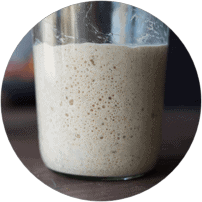
Sourdough Starter Guides
A sourdough starter is a stable mixture of suitable bacteria and wild yeasts. By regularly feeding (refreshing) a starter, we “train” the culture to produce desired flavors and have sufficient strength for leavening dough.
- How To Make Your Own Sourdough Starter From Scratch
- How do I feed my sourdough starter?
- Maintaining a sourdough starter (spotting the signs of ripeness each day)
- How to save sourdough starter discard in the fridge in a cache to have discard on hand whenever you need it
- What is a levain, and how is it different from a starter?
- Keeping a small sourdough starter to reduce waste
- Storing a sourdough starter (for short or very long periods)
- How to store a sourdough starter in the fridge for vacation and not feed it for up to 3 weeks
- Sourdough starter frequently asked questions (FAQ)
- 21 common sourdough starter problems with solutions
- Simplify Starter Maintenance with the Sourdough Home
See all my sourdough starter guides →

Bread Dough Shaping Guides
Shaping dough is technically challenging and one of the most enjoyable parts of the baking process. While there are many ways to form dough into various shapes, these are my preferred methods for shaping everything.
- How to shape and proof baguettes
- How to shape a batard (oval loaf)
- How to shape a boule (round loaf)
- How to shape a pan loaf (sandwich bread, Pullman loaf, or pain de mie)
- How to shape buns and rolls (or pizza dough)
See all my bread dough shaping guides →

Bread Baking Schedule Guides
Most homebakers tend to revolve their baking around their time off; this usually means baking on the weekend. While my guide to a weekend baking schedule focuses on this, it’s possible to shift this schedule to bake on any day of the week. We all lead busy lives, but we can work baking into even the busiest schedules with a few handy tips.
- Weekend baking schedule (bake bread only on the weekend)
- A simple weekday baking schedule and recipe (bake bread during the busy workweek)
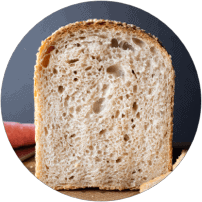
Guides to Other Bread Baking Techniques
Baking with sourdough isn’t limited to baking large, crunchy loaves of bread. The following guides are handy techniques to bring another dimension to your baking.
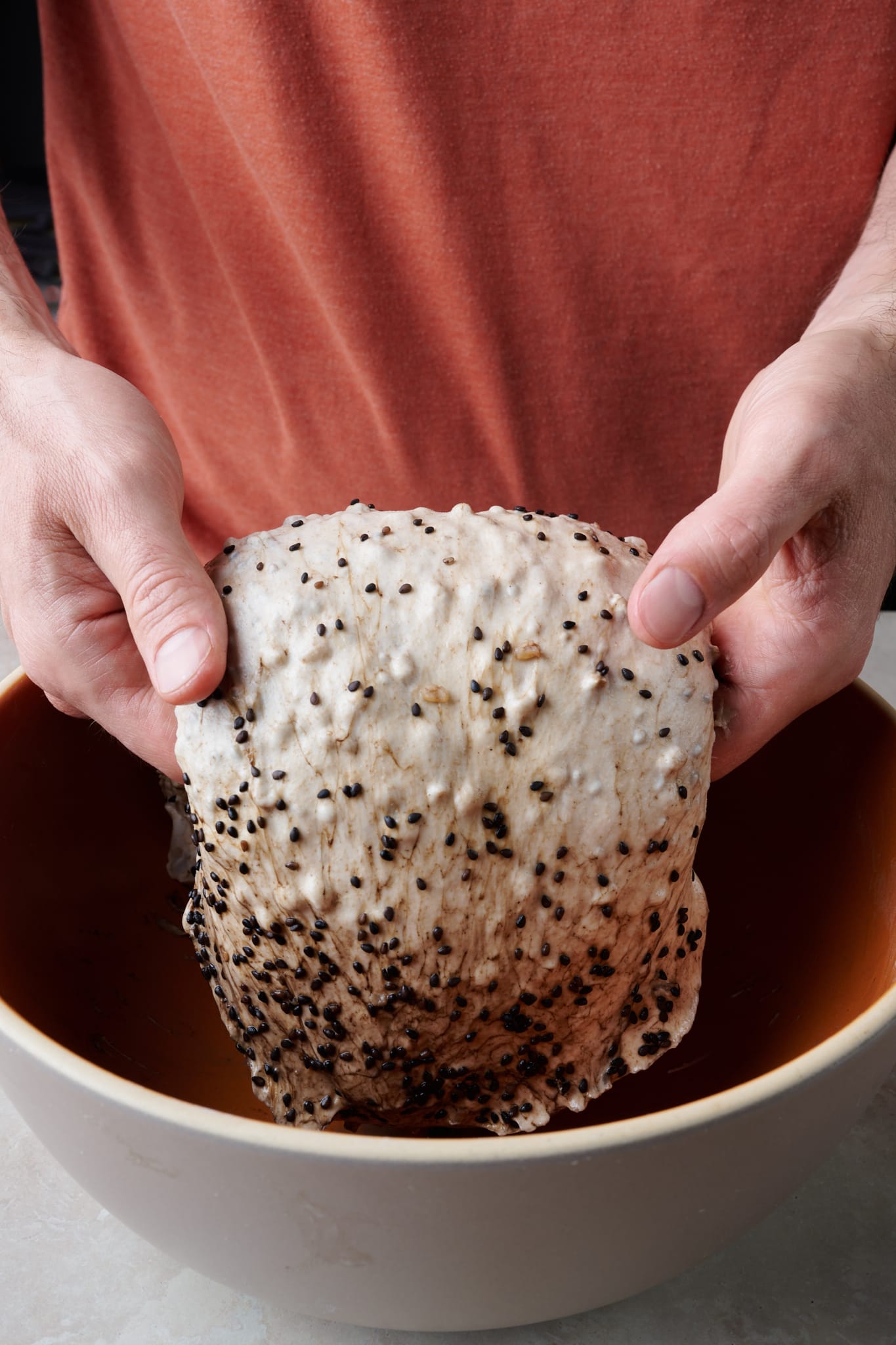
Flour and Ingredient Guides
Baking with sourdough isn’t limited to baking large, crunchy loaves of bread. The following guides are handy techniques to bring another dimension to your baking.
Flour Guides
- How to Make Great Sourdough Bread with High-Protein White Bread Flour
- The Best Way to Store Flour
- What is Durum Flour?
- What is Diastatic Malt Powder?
- How to Freshly Mill Flour At Home For Baking
Ingredient Guides
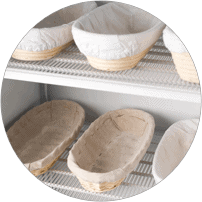
Baking Tools and Equipment Guides
Sometimes, having the right tools can make all the difference, especially for a home baker when the kitchen environment changes drastically daily. The following guides help improve your baking environment to increase consistency.
Tools For Mixing Bread Dough
- How to Use a Famag Spiral Dough Mixer (a larger mixer for large batches of dough)
Tools For Proofing Bread Dough
- How to use the Brød and Taylor dough proofer to make sourdough bread
- How to build a dough retarder to cold-proof dough overnight
Tools For Baking Bread Dough
- How to bake bread in a Dutch oven
- How to steam your home oven to bake bread (baking without a Dutch oven)
- How to bake sourdough bread with a thin crust
- How to Bake in the Rofco Bread Oven (a larger oven for baking more bread)
- How to Bake in the RackMaster Bread Oven (a larger oven for baking more bread)
See all my favorite and best baking tools →

Sourdough Pizza and Flatbread Guides
Pizza, especially sourdough pizza, ranks with some of my favorite foods. I find naturally leavened, long-fermented pizza dough has added flavor, a more tender texture, and increased nutritional content. The following guides will help you cook the best pizza in your home kitchen.
Read through my ultimate guide to all things sourdough pizza dough →
Videos
For more baking techniques and recipe videos, visit The Perfect Loaf’s YouTube channel →
